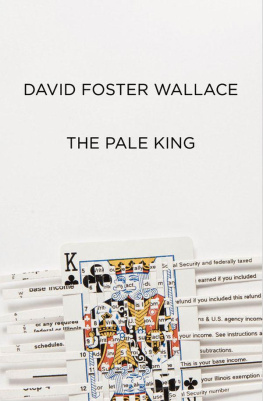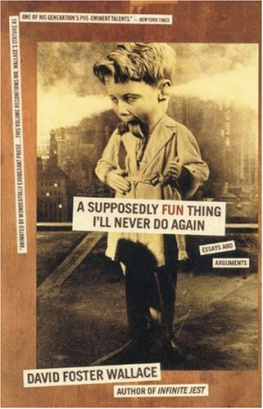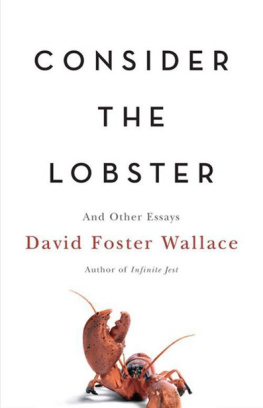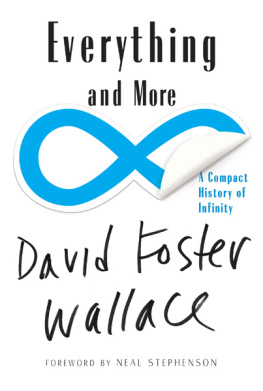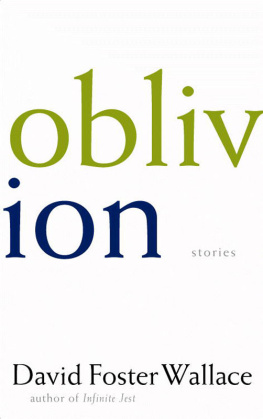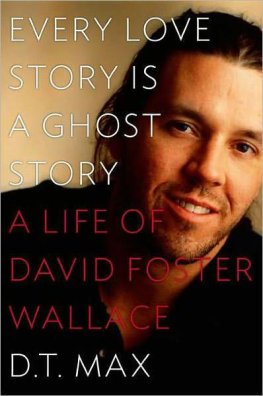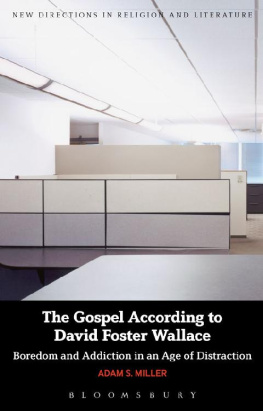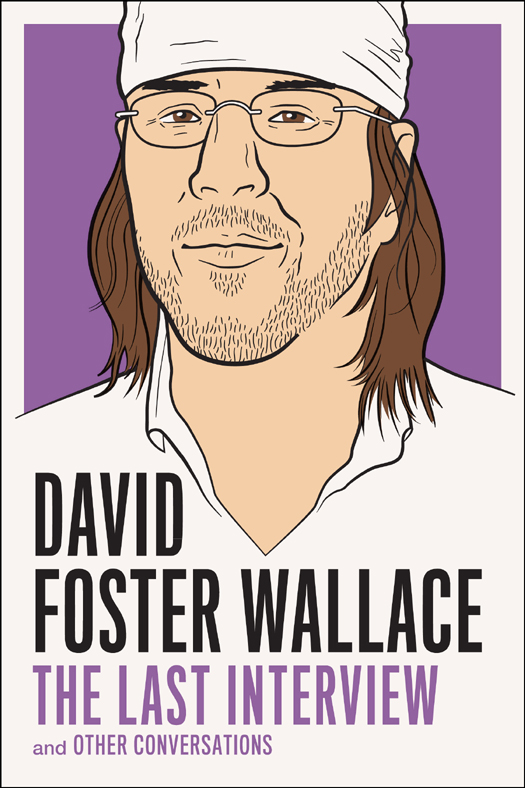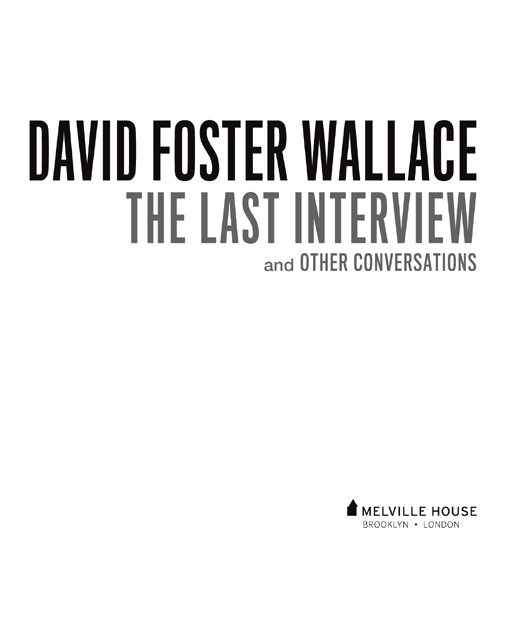DAVID FOSTER WALLACE: THE LAST INTERVIEW
2012 Melville House Publishing
There Can Be No Spokesman Tom Scocca. Interview conducted for the Boston Phoenix, which published an edited version in 1998.
A Brief Interview with a Five-Draft Man: First published in Amherst magazine, published by the Trustees of Amherst College.
To Try Extra Hard to Exercise Patience, Politeness, and Imagination:
This interview first appeared in the November 2003 issue of the Believer.
Reprinted by permission.
Some Kind of Terrible Burden: first broadcast on To the Best of Our Knowledge, a production of Wisconsin Public Radio and Steve Paulson, Executive Producer. 2004 Board of Regents of the University of Wisconsin System.
The Last Interview: Reprinted by permission of the Wall Street Journal, 2008 Dow Jones & Company, Inc. All Rights Reserved Worldwide.
License number 2938361379117
First Melville House printing: December 2012
Melville House Publishing
145 Plymouth Street
Brooklyn, NY 11201
www.mhpbooks.com
eISBN: 978-1-61219-207-9
A catalog record for this book is available from the Library of Congress
v3.1_r1
CONTENTS
SOMETHING REAL AMERICAN
Interview by Laura Miller
Salon
March 9, 1996
THERE CAN BE NO SPOKESMAN
Interview by Tom Scocca
Boston Phoenix
February 20, 1998
A BRIEF INTERVIEW WITH A FIVE-DRAFT MAN
Interview by Stacey Schmeidel
Amherst Magazine
Spring 1999
TO TRY EXTRA HARD TO EXERCISE PATIENCE, POLITENESS, AND IMAGINATION
Interview by Dave Eggers
The Believer
November 2003
SOME KIND OF TERRIBLE BURDEN
Interview by Steve Paulson
To the Best of Our Knowledge
June 17, 2004
THE LAST INTERVIEW
Interview by Christopher Farley
Wall Street Journal
May 2008
SOMETHING REAL AMERICAN
INTERVIEW BY LAURA MILLER
FIRST PUBLISHED INSALON
MARCH 9, 1996
David Foster Wallaces low-key, bookish appearance flatly contradicts the unshaven, bandanna-capped image advanced by his publicity photos. But then, even a hipster novelist would have to be a serious, disciplined writer to produce a 1,079-page book in three years. Infinite Jest, Wallaces mammoth second novel, juxtaposes life in an elite tennis academy with the struggles of the residents of a nearby halfway house, all against a near-future background in which the US, Canada and Mexico have merged, Northern New England has become a vast toxic waste dump and everything from private automobiles to the very years themselves are sponsored by corporate advertisers. Slangy, ambitious and occasionally over-enamored with the prodigious intellect of its author, Infinite Jest nevertheless has enough solid emotional ballast to keep it from capsizing. And theres something rare and exhilarating about a contemporary author who aims to capture the spirit of his age.
The 34-year-old Wallace, who teaches at Illinois State University in Bloomington-Normal and exhibits the careful modesty of a recovering smart aleck, discussed American life on the verge of the millennium, the pervasive influence of pop culture, the role of fiction writers in an entertainment-saturated society, teaching literature to freshmen and his own maddening, inspired creation during a recent reading tour for Infinite Jest.
MILLER: What were you intending to do when you started this book?
DFW: I wanted to do something sad. Id done some funny stuff and some heavy, intellectual stuff, but Id never done anything sad. And I wanted it not to have a single main character. The other banality would be: I wanted to do something real American, about what its like to live in America around the millennium.
MILLER: And what is that like?
DFW: Theres something particularly sad about it, something that doesnt have very much to do with physical circumstances, or the economy, or any of the stuff that gets talked about in the news. Its more like a stomach-level sadness. I see it in myself and my friends in different ways. It manifests itself as a kind of lostness. Whether its unique to our generation I really dont know.
MILLER: Not much of the press about Infinite Jest addresses the role that Alcoholics Anonymous plays in the story. How does that connect with your overall theme?
DFW: The sadness that the book is about, and that I was going through, was a real American type of sadness. I was white, upper-middle-class, obscenely well-educated, had had way more career success than I could have legitimately hoped for and was sort of adrift. A lot of my friends were the same way. Some of them were deeply into drugs, others were unbelievable workaholics. Some were going to singles bars every night. You could see it played out in 20 different ways, but its the same thing.
Some of my friends got into AA. I didnt start out wanting to write a lot of AA stuff, but I knew I wanted to do drug addicts and I knew I wanted to have a halfway house. I went to a couple of meetings with these guys and thought that it was tremendously powerful. That part of the book is supposed to be living enough to be realistic, but its also supposed to stand for a response to lostness and what you do when the things you thought were going to make you OK, dont. The bottoming out with drugs and the AA response to that was the starkest thing that I could find to talk about that.
I get the feeling that a lot of us, privileged Americans, as we enter our early 30s, have to find a way to put away childish things and confront stuff about spirituality and values. Probably the AA model isnt the only way to do it, but it seems to me to be one of the more vigorous.
MILLER: The characters have to struggle with the fact that the AA system is teaching them fairly deep things through these seemingly simplistic clichs.
DFW: Its hard for the ones with some education, which, to be mercenary, is who this book is targeted at. I mean this is caviar for the general literary fiction reader. For me there was a real repulsion at the beginning. One Day at a Time, right? Im thinking 1977, Norman Lear, starring Bonnie Franklin. Show me the needlepointed sampler this is written on. But apparently part of addiction is that you need the substance so bad that when they take it away from you, you want to die. And its so awful that the only way to deal with it is to build a wall at midnight and not look over it. Something as banal and reductive as One Day at a Time enabled these people to walk through hell, which from what I could see the first six months of detox is. That struck me.
It seems to me that the intellectualization and aestheticizing of principles and values in this country is one of the things thats gutted our generation. All the things that my parents said to me, like Its really important not to lie. OK, check, got it. I nod at that but I really dont feel it. Until I get to be about 30 and I realize that if I lie to you, I also cant trust you. I feel that Im in pain, Im nervous, Im lonely and I cant figure out why. Then I realize, Oh, perhaps the way to deal with this is really not to lie. The idea that something so simple and, really, so aesthetically uninterestingwhich for me meant you pass over it for the interesting, complex stuffcan actually be nourishing in a way that arch, meta, ironic, pomo stuff cant, that seems to me to be important. That seems to me like something our generation needs to feel.


